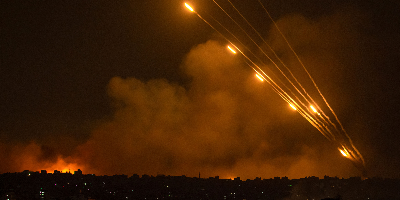2 ottob 2023 anni - Lebanon's Hezbollah, a Shiite militant group backed by Iran, has long been a significant player in the Middle East.
Descrizione:
Tel Aviv, Israel Edited By: Heena SharmaHezbollah vs Israel: Hezbollah or "Party of God", was founded in 1982 by Iran's Revolutionary Guards. Its primary objectives were to export Iran's Islamic Revolution and combat Israeli forces that had invaded Lebanon during the Lebanese Civil War (1975-1990).
It is not just Israel vs Hamas but also Israel vs Hezbollah. Why? Lebanon's Hezbollah, a Shiite militant group backed by Iran, has long been a significant player in the Middle East. Amid the ongoing war between Israel and Hamas, Hezbollah, lending support to Hamas, is targeting Israeli military positions in the disputed Shebaa Farms area by raining down its rockets. The Shiite group boasted that the move was purportedly "in solidarity" with the Palestinian people following an unprecedented attack by Hamas gunmen from Gaza into Israeli territory.
“On the path to liberate the remaining part of our occupied Lebanese land and in solidarity with the victorious Palestinian resistance and the steadfast Palestinian people, the groups of the martyr commander Hajj Imad Moghniyeh in the Islamic Resistance carried out an attack this Sunday, October 08, 2023, targeting 3 Zionist occupation sites in the occupied Lebanese Shebaa Farms region,” Hezbollah said in a statement.
To understand Hezbollah's moves on the Israel-Hamas war chessboard and its broader repercussions, it is essential to first know about its origins, military capabilities, and regional influence.
Rise of Hezbollah
Hezbollah or "Party of God", was founded in 1982 by Iran's Revolutionary Guards. Its primary objectives were to export Iran's Islamic Revolution and combat Israeli forces that had invaded Lebanon during the Lebanese Civil War (1975-1990).
Israel's military operation aimed to eliminate the Palestinian Liberation Organisation (PLO) presence in Lebanon but also led to the occupation of parts of southern Lebanon.
This occupation galvanised Shiite communities in the south, who saw themselves as resisting Israeli aggression. Hezbollah aligned itself with Tehran and recruited its members from within the Lebanese Shiite Muslim community.
Following Israel's withdrawal in 2000 and the conclusion of the civil war, Hezbollah, with support from Iran, assumed the role of Israel's main enemy in Lebanon.
The most prominent display of Hezabollah's military might was in 2006 during a five-week war with Israel. This conflict erupted when Hezbollah crossed into Israel and abducted two soldiers while killing others.
What is Hezbollah's military might?
Hezbollah claims that its rockets can reach all parts of Israel. It has received extensive military assistance from Iran since its inception.
Over the years, it has amassed a formidable arsenal of rockets, missiles, and other weaponry. This support allows Hezbollah to maintain a deterrent against Israel.
The group also deployed forces into Syria in 2012 to support President Bashar al-Assad against predominantly Sunni rebel factions. Hezbollah now boasts precision rockets.
In 2021, its leader, Sayyed Hassan Nasrallah, asserted that Hezbollah had 100,000 fighters. Some estimates indicate Iran provided hundreds of millions of dollars annually to the group.
Regional influence
Hezbollah's influence extends far beyond Lebanon. The group maintains deep ties with other Iran-backed factions in the region, including Palestinian groups like Hamas and Islamic Jihad.
Amid the ongoing war between Israel and Hamas, Hezbollah claimed direct contact with the Palestinian resistance leadership.
Hezbollah has been involved in training Iran-backed groups in Iraq and has participated in combat operations there. While Saudi Arabia alleges that Hezbollah has supported Iran-allied Houthi rebels in Yemen, the group vehemently denies these claims.
Hezbollah's foothold in Lebanon
Hezbollah holds seats in the Lebanese parliament and key ministerial positions. With this political involvement, Hezbollah wields significant influence in the country.
However, Lebanese factions opposed to Hezbollah assert that the group has undermined the state and has unilaterally led Lebanon into conflicts.
When the Lebanese government pledged to take action against Hezbollah's military communications network, a power struggle erupted in 2008, pitting Hezbollah fighters against Lebanese adversaries backed by Western countries and Saudi Arabia.
Hezbollah has been accused of participating in or orchestrating various attacks on Western targets. It includes the 1983 US Embassy and Marine barracks bombings in Beirut, Lebanon, which killed hundreds of Americans. Another one is the 1985 hijacking of TWA Flight 847, leading to the murder of a US Navy diver. 1992 and 1994 bombings in Argentina targeting the Israeli Embassy and a Jewish community centre, are other such incidents.
Western nations, including the United States, designate Hezbollah as a terrorist organisation, and so do Saudi Arabia. The European Union, however, classifies only Hezbollah's military wing as a terrorist group, while its political wing remains unlisted.
The lands of Israel and Gaza stand are bearing the brunt of a relentless torrent of violence that has drenched their soil with blood. The Israeli government said that it is engaged in a war against the Palestinian militant group Hamas, which controls Gaza. Israel views these groups as threats to its security. Hezbollah, on the other hand, has positioned itself as a staunch supporter of Palestinian resistance against Israeli "occupation". The power struggle is getting real... by the minute.
Aggiunto al nastro di tempo:
Data:
2 ottob 2023 anni
Adesso
~ 1 years and 8 months ago
